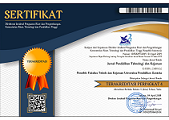EFEKTIVITAS APLIKASI UAS ONLINE DALAM MENJAGA MUTU PERKULIAHAN DI MASA PENDEMI COVID-19
DOI:
https://doi.org/10.23887/jptk-undiksha.v18i2.34101Keywords:
Final Examination, Covid-19 pandemic, LP3M, R&DAbstract
The presence of Covid-19 causes all elements to change their habits. Especially by government regulations which require working from home, studying from home, and worshipping from home. Final Semester Examina-tion (UAS) is a way to evaluate the level of understanding of students. It must be administered correctly and with good quality. You cannot be careless. The development of technology to ensure the quality and independence of UAS trips that has been carried out. The research aims to see the effectiveness of the online UAS application in maintaining the quality of lectures during the Covid-19 epidemic. To see whether the application is built by function, suitability, usability, reliability, performance efficiency, and ease of maintenance. The online UAS application is built using a website-based programming language and a server-based database. The method in this study uses R&D. The research variables of the Politeknik Unggul LP3M Students were 29 students. The UAS application built made it more accessible and improved the quality of lectures during the Covid-19 pandemic. The UAS application that was built has three user authorizations, including admins, lecturers, and students. By the test results, the UAS application is said to meet the eligibility. Among them, the application test score is 85.33% (Very Appropriate), and the Cronbach Alpha value is 0.87 (Excellent).Downloads
Published
2021-07-30
Issue
Section
JPTK
License
Authors who publish with the JPTK agree to the following terms:- Authors retain copyright and grant the journal the right of first publication with the work simultaneously licensed under a Creative Commons Attribution License (CC BY-SA 4.0) that allows others to share the work with an acknowledgment of the work's authorship and initial publication in this journal
- Authors are able to enter into separate, additional contractual arrangements for the non-exclusive distribution of the journal's published version of the work (e.g., post it to an institutional repository or publish it in a book), with an acknowledgment of its initial publication in this journal.
- Authors are permitted and encouraged to post their work online (e.g., in institutional repositories or on their website) prior to and during the submission process, as it can lead to productive exchanges, as well as earlier and greater citation of published work. (See The Effect of Open Access)












